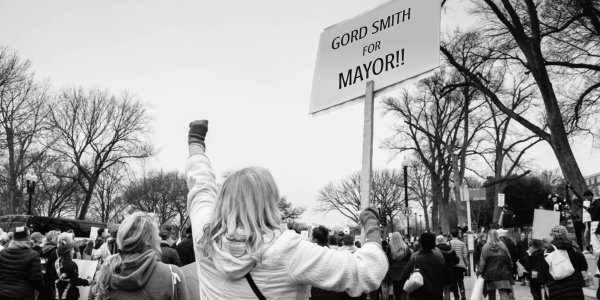Clearly this woman didn’t know who she was talking to, and wasn’t able to recognise when she offended someone. She raised her hand now, to pull a strand of bleached blonde hair away from her face as the wind picked up, completely unaware of my response to what she was saying. The sun shone strongly behind the nearly naked maple to her right, its few remaining leaves dappling her with shadows like a spray of moving freckles across her nose.
“Council blocked Duncan from his office in April last year,” she continued, as if she was relaying new information. “Gordon Smith was the first to suggest that his time was over, and he helped to motivate the Council. Then Duncan, who can’t stand to be told no, rented an office outside of City Hall, though Council had barred him from entering the Mayor’s office after 4:30 PM or on the weekends. He just kept saying that the work of the Mayor extended beyond regular business hours, and he needed to be able to meet with people up to seven or eight in the evening to respect their hours. I mean, really? Duncan can’t be trusted to speak to people in a civil tone, and look at the way he throws this town’s money around. It’s criminal. Yet he parades around at all hours of the day or evening, as if he’s the king or something.”
I knew the history of Council’s disagreement with our Mayor, the arguments for and against him. This town was clearly divided, but she had a number of things wrong. Duncan had an incredibly strong following who believed he was the best thing that had happened on City Council in a hundred years. He was what some people called The People’s Mayor, someone who tried to take out the strong divide between the rich and the poor in a city that had been built on the fossil fuel industry. He recognized the end of that industry was coming, and that the city had to develop in a different direction or it would collapse just as fossil fuels were doomed to be replaced by environmentally sound, efficient, energy sources. That was why the old guard didn’t like him. He represented the end of an era. He was well educated, he had travelled, and he had risen from his start in the ghettos of London, just an hour’s drive from here. He supported teachers and librarians and clerks and small business people just as he saw the need for, and supported, big industry. But he didn’t sweep the ground that the fossil fuel giants walked upon. He tried to develop a balanced relationship with all manner of businesses and concerns.
During his time in office, the bus routes had been extended into the southern part of the city and they now ran closer to the factories. Duncan had been supportive of the group that called for bicycle lanes to be painted in bright green along roadways in the city center. He had assisted the group that started to raise funds for art projects throughout the year, expanding their tiny financial base through his promotion to area businesses. He understood that the culture of our city was developed in part through an interest in extra curricular activities in the schools such as carpentry, and choir, and theatre, and dance. He personally attended high profile book launches when someone who had been raised in this city made sure their tours took them back to their home town. He just seemed to know who was doing something that would be important to the general population living here.





